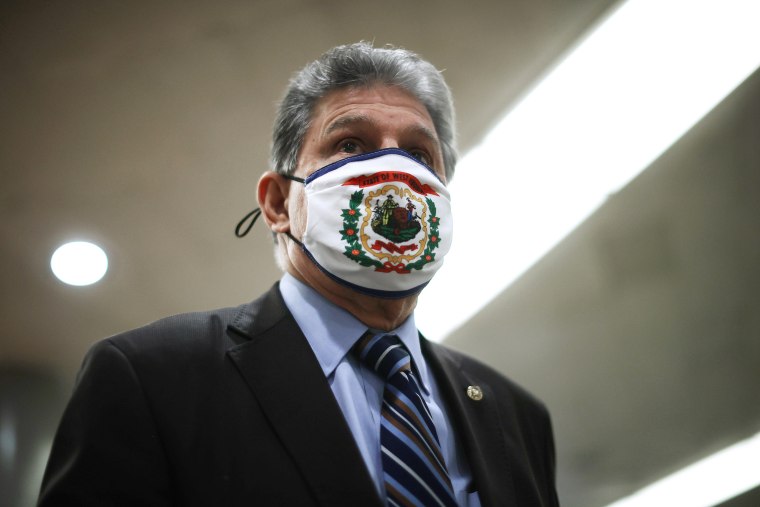Now that the Covid-19 stimulus bill is heading to President Joe Biden's desk, the Democrats have a number of options for their next act. Most pressing is the For the People Act, also known as H.R. 1, a series of election reforms the House passed March 3.
Manchin believes that the filibuster — which requires 60 votes to override it to allow a bill to pass in a final majority vote — helps make compromises possible.
The bill, if it becomes law, would rewrite how federal elections are held in the United States, banning congressional gerrymandering, requiring states to implement automatic voter registration and same-day registration and restoring voting rights to disenfranchised former felons. It's basically the antithesis of the deluge of GOP-sponsored bills in the states that would restrict access to the polls, most of which target minority voters.
But it, like almost everything left on the Biden agenda that isn't infrastructure, is plagued by a single question: "How do you get past a Republican filibuster?" And, friends, I think it's about time that we embraced a little something I would like to call "the Manchin rule."
"The Manchin rule" is a hypothetical, not a thing that actually exists right now. It's not even something that has been directly endorsed by Sen. Joe Manchin, D-W.Va., whose vote is needed for any change in how the Senate functions. But, as I'll explain in a second, it may be what saves our country.
As things stand, Manchin believes that the filibuster — which requires 60 votes to override it to allow a bill to pass in a final majority vote — helps make compromises possible. That belief has a few problems, not least of which is what will happen when the minority party has no interest in budging from its obstructionist position.
Sometimes you need to make compromises to get things done.
And how does the Senate GOP feel about the For the People Act? "Everything about this bill is rotten to the core. This is a bill as if written in hell by the devil himself," Sen. Mike Lee, R-Utah, said Wednesday on Fox News, rather succinctly setting the tone for the coming debate.
Yes, Lee is pretty far to the right of center, but I've yet to see any indications from more moderate Republicans that they support the bill as it stands or are even willing to offer up changes that would gain their votes. Nor have I heard much from any of them about the anti-voting rights bills in the states. So finding 10 Republicans willing to invoke cloture and have a vote on the bill's merits seems unlikely.
Now, Manchin and Sen. Kyrsten Sinema, D-Ariz., have both said they firmly oppose ditching the filibuster. For the moment, then, let's set aside my many previous arguments for getting rid of the filibuster. I still stand by that position, but as Manchin himself would agree, sometimes you need to make compromises to get things done. In this case, it may mean that the filibuster gets to live — but with major reforms.
Changes to the filibuster are more common than you'd think, as Vox's Ian Millhiser noted Tuesday. Millhiser cited the Brookings Institution's Molly Reynolds, whose research shows that Congress has put more than 150 limitations on when bills can be filibustered. That opens the door to more finagling to get the For the People Act over the finish line.
It may mean that the filibuster gets to live — but with major reforms.
As far as I can tell, it was Sen. Raphael Warnock, D-Ga., who first told reporters that he could see a world where bills related to voting and civil rights are exempt from being filibustered. It's an idea that has been endorsed by other Black political powerhouses since then, including House Majority Whip Jim Clyburn, D-S.C., and Warnock's fellow Georgian Stacey Abrams.
That prospect became more feasible with Manchin's having opened the door to filibuster reform when he made the rounds of the Sunday shows last weekend. One of his proposals was to go back to requiring senators to actually hold the floor to sustain filibusters. "I'm willing to look at any way we can, but I'm not willing to take away the involvement of the minority," he said.
Which brings us back to "the Manchin Rule." If he wants to keep the filibuster but comes out in favor of revising the rule to allow civil rights bills to pass with simple majorities, I totally think that's worth naming the change after him, immortalizing it alongside the rule named for the late Sen. Robert Byrd, his fellow West Virginian, which governs what budget items can dodge the filibuster.
Like I said, Manchin hasn't endorsed this specific proposal. And yes, I understand that the optics of putting a white man's name on a proposal shepherded by Black voices feels a little like marketing Pat Boone's cover of "Tutti Frutti." But hey, you gotta do what you gotta do when the future of free and fair elections in the U.S. is on the line. And as Warnock said March 4, "The issues are urgent enough to leave all options on the table."

